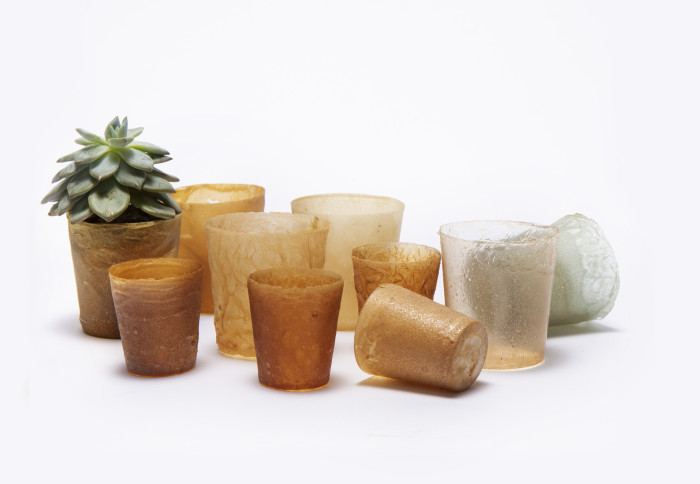Seafood waste sustainable packaging wins Imperial’s biggest startup competition

Image credit: The Shellworks
A team of Imperial students is turning waste crustacean shells into biodegradable, compostable products, providing a plastic packaging alternative.
The Shellworks, founded by Imperial College London graduates Insiya Jafferjee, Amir Afshar and Edward Jones, won the Venture Catalyst Challenge 2020 for their invention which turns waste crustacean shells into biodegradable, composable products which can be used as an alternative to plastic.
The Venture Catalyst Challenge (VCC) is the College’s largest entrepreneurial competition for students and alumni, enabling them to develop an innovative idea for commercialisation. The competition is run by Imperial Enterprise Lab and powered by Blenheim Chalcot, the UK’s leading venture builder.
All-digital final
The team took home the £30,000 top prize after battling it out against four other startups during the competition's first ever all-digital final.
After an intense 7-week programme of workshops, mentoring and business coaching, 25 teams, divided into 5 themed tracks, pitched to expert panels in the heats in March. The winner of each track was awarded £10,000 and then competed to win the £20,000 Grand Prize.
Sustainable packaging
6.3 billion tonnes of plastic waste has been created on earth to date and The Shellworks are hoping to make this a thing of the past. They create materials that can break down in any natural environment by extracting a biopolymer that is found in shellfish waste called chitin.
Chitin, which is, the world’s second most abundant biopolymer, is found in crustaceans, insects and fungi, but needs to be chemically extracted from the source before it can be turned into a useful material. The team has created a series of machines that recycle, extract, and form this biopolymer into a biodegradable and recyclable plastic - they have already secured 55 thousand tonnes of shell waste which allows them to make 175 million products annually.
The team is starting by focusing on the global cosmetics packaging market. They have already secured two paid pilots from a perfume company and a skincare company and will work with them on making sustainable bottle caps, trays and outer packaging.
Over 800 members of the public also voted for their favourite semi-finalist pitch for the £500 People’s Prize, which was won by Treeconomy. They provide a one-stop-shop for landowners to earn money by planting trees and combatting climate change.
The Imperial Venture Mentoring Service also selected their favourite finalist pitch and awarded them a £500 bonus prize and time with the competition’s headline sponsor Blenheim Chalcot. The Mentor Prize went to Salty Co who are creating the first ever freshwater-free fabric, using salt-resistant plant fibres.
Track winners
The competition was split into five themed tracks, with the winner of each track also claiming £10,000. The Shellworks won the Energy & Environment track, sponsored by ABB.
Other winners were:
Creative & Consumer - sponsored by Imperial College London
SaltyCo, who won this year’s Mentor Prize, aims to reduce global freshwater consumption by creating alternative, freshwater-free textiles. One of the main consumers of freshwater, an increasingly depleting resource, is the textiles industry where freshwater is used in the production of both natural and synthetic fabrics.

Digital & Fintech - sponsored by Santander Universities
Hippocampus is an immersive virtual reality platform for those who need help with their long-term memory. The platform draws on the ancient Greek technique of the Memory Palace, which uses visualisations of familiar spatial environments in order to enhance and improve the recall of information and is favoured by Sherlock Holmes.
Health & Wellbeing - sponsored by P&G Ventures
Bia.Care is a digital platform that supports women during menopause by connecting them with clinicians of different specialties through virtual group consultations. Women can receive information and personalised care that addresses both their medical symptoms and long-term goals.
AI & Robotics - sponsored by Amazon Robotics
Powered by AI, Third Eye Intelligence aims to increase intensive care survival rates to predict the risk of organ failure. They have developed AI capable of forecasting clinical deterioration, predicting the risk of organ failure and guiding targeted treatment planning. By giving clinicians ample warning and guidance, they hope that their system can help save lives and resources.
Pushing boundaries of innovation
This year’s competition also saw the introduction of two new prizes, which were awarded ahead of the final.
The Moonshot Prize, sponsored by AirAsia, was awarded to The Tyre Collective for challenging the status quo and pushing boundaries of innovation. They were awarded £10,000 for their innovation to collect harmful tyre particles from vehicles, one of the largest contributors to air pollution.

The Social Impact prize of £10,000, sponsored by Grosvenor, was awarded jointly to Recycleye and Tempo Market to raise the profile of teams seeking to make a positive impact on the world.
Recycleye is a waste sorting solution that uses deep-learning and artificial intelligence (AI) to enable automated sorting of waste. Tempo Market offers easy camping equipment rentals to campsite visitors, overcoming the need to own your own equipment, saving customers money and making campsites accessible to a whole new market.
Article text (excluding photos or graphics) © Imperial College London.
Photos and graphics subject to third party copyright used with permission or © Imperial College London.
Reporter
Joanna Wilson
Communications Division
